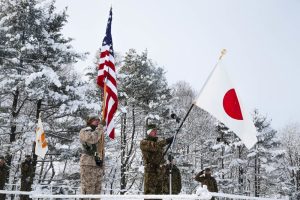The U.S. Marine Corps and the Japan Ground Self-Defense Force started a bilateral training exercise on Sunday in Japan. Exercise Northern Viper began at the Hokudaien and Yausubetsu Training Areas on Japan’s northern island of Hokkaido on Sunday. The exercise will run until February 8.
The exercise will involve a combined arms exercise and a live-fire drill featuring both ground and airborne units from both sides.
“This is an opportunity for us to improve our own tactics, techniques, and procedures in cold weather and also an opportunity for us to improve our interoperability with our Ground Self-Defense Force counterparts,” Col. Jason S.D. Perry, 4th Marine Regiment commanding officer and commander of the Marine Air-Ground Task Force, said in a statement released by the 3rd U.S. Marine Division.
This year’s Northern Viper exercise will include around 2,300 U.S. Marines, drawn from the III Marine Expeditionary Force, a forward-deployed U.S. Marine Corps formation headquartered in Okinawa, Japan.
In addition to the 2,300 U.S. Marines, the exercise will feature approximately 650 GSDF personnel from the GSDF’s 4th Infantry Regiment, 5th Brigade. 500 troops from the GSDF‘s 5th Field Artillery Unit will also participate.
“During this iteration, the combined force will focus on winter combat training, bilateral marksmanship integrated with firepower and maneuver, helicopter diving fire, sniper training, combined arms integration, a Japan and U.S comprehensive bilateral attack, and a Low Altitude Tactics (LAT) insert from MV-22B Osprey,” a U.S. Marine Corps statement noted.
A Japanese Ministry of Defense statement released in December 2019 said that the purpose of the 2020 Northern Viper exercise would be “live-fire training and bilateral and combined armed training through Air-to-Ground cooperation under various terrain and weather.”
Exercise Northern Viper took place for the first time in August 2017, featuring more than 2,000 U.S. Marines and 1,500 GSDF members. The first iteration took place at Misawa Air Base on Hokkaido.
“This exercise enhances and improves interoperability at the tactical level between the Marines and JSDF to keep the forces formidable and adaptive,” a U.S. Marine Corps statement noted at the time.
Northern Viper “tests the interoperability and bilateral capability of the JSDF and U.S. Marine Corps forces to work together across a variety of areas including peacekeeping operations, humanitarian assistance and disaster relief,” the statement added.
The United States and Japan have been military allies since 1960, when they concluded a security treaty. Japan hosts approximately 50,000 U.S. troops, constituting a significant forward deployment point for the U.S. military in the Asia-Pacific.

































